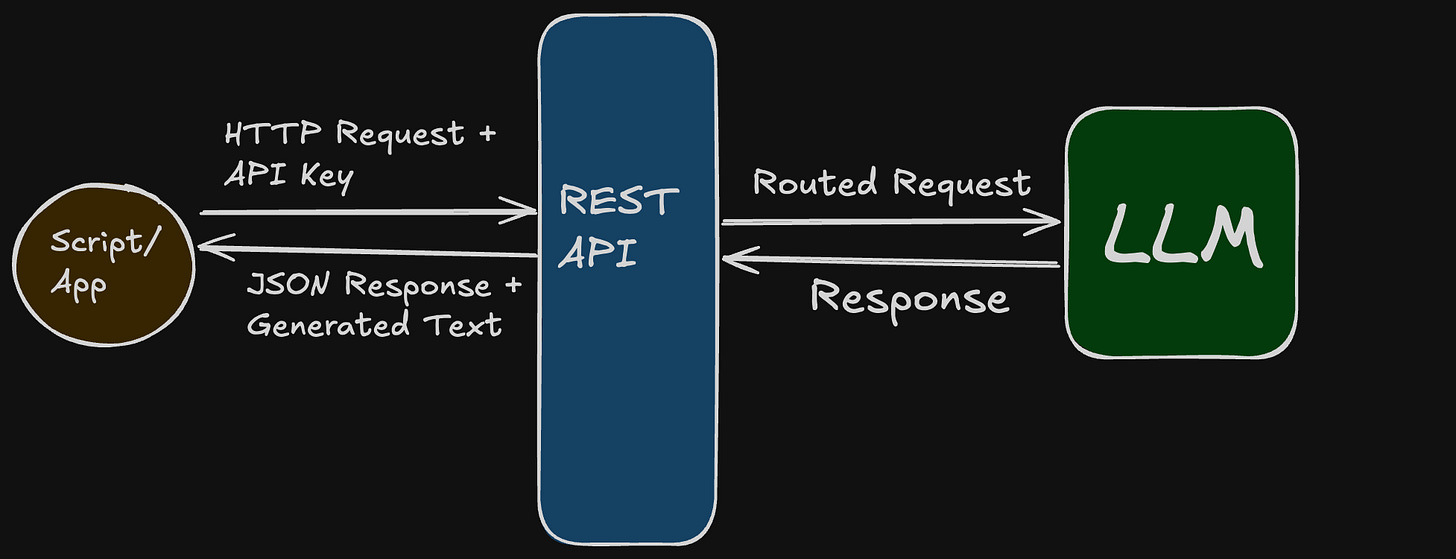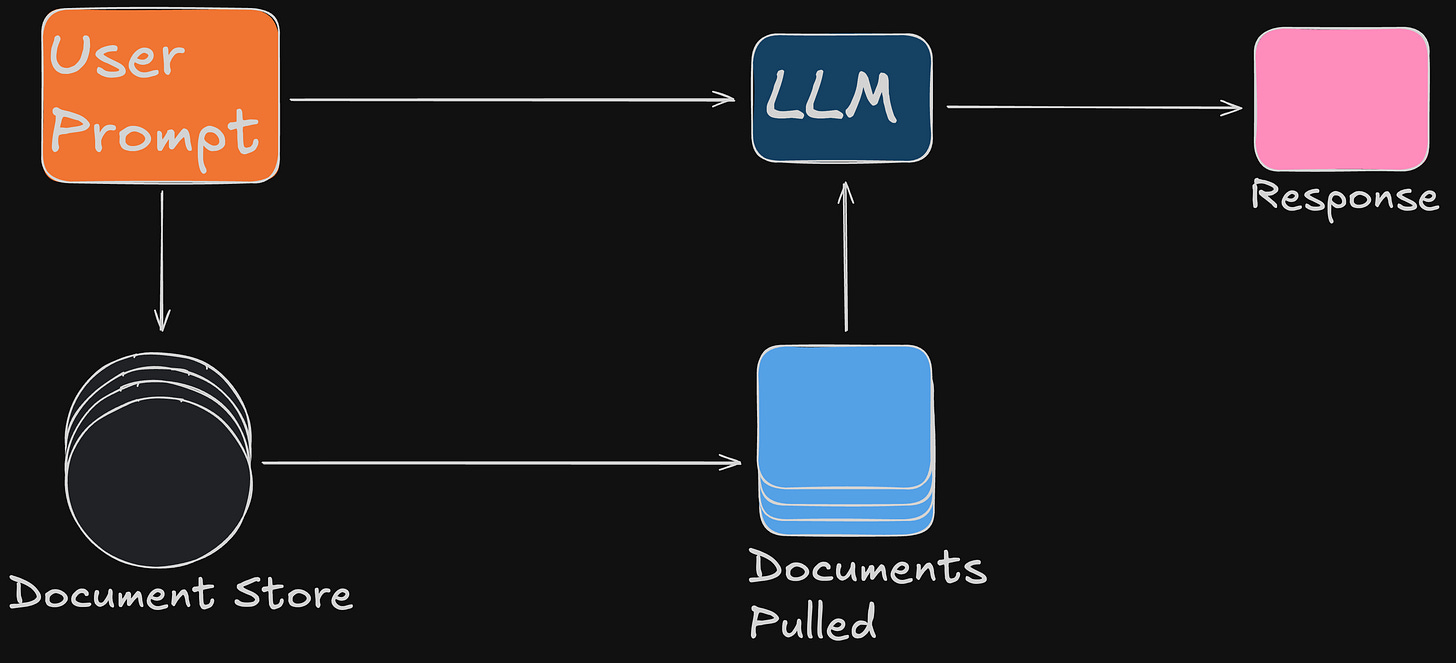Last Week: The Ultimate Docker Project: Part Two 🐋
Next Week: What actually is Kubernetes? 📦
This Week: 2025 AI Roadmap 🛣️
This is NOT the “Follow this AI roadmap to land a 100k role” anyone punting that at you should be swiftly ignored.
What this IS. A small list of areas I would cover if I was looking to get started bringing AI into my engineering skillset.
The quickest way to start building with AI is through APIs. Rather than creating your own models from scratch, you can tap into already trained models from providers like OpenAI and Anthropic with just a small snippet of code.
Both OpenAI and Anthropic offer straightforward REST APIs that you can call from any programming language. The key is understanding that you're essentially having a conversation with the model, you send text (prompts) and get text back, this is called completions (the outputs that AI models generate in response to given prompts or inputs).
Here's what you need:
An API key from your chosen provider
A basic understanding of HTTP requests
A script or application to integrate with
I challenge you to try this, it’s really not as complex as you might think.
The thing about AI in the real world is a lot of companies aren't calling OpenAI's API directly from a Python script. They're using cloud platforms that wrap AI capabilities into enterprise services with proper security, scaling, and compliance.
Learning cloud AI services alongside the fundamentals is an awesome combination right now.
Two places you could start…
Azure AI Foundry
Microsoft's AI platform that uses model deployment, fine tuning, and application development. It's really decent if you're already in the Microsoft ecosystem.
What makes it v cool:
Integrated with Azure's security and compliance features
Built in RAG capabilities
Flippen massive model catalogue including GPT4, Claude, and open source options from hugging face etc
AWS Bedrock
Amazon's managed service for foundation models, designed for enterprise scale AI applications.
Key advantages:
Serverless, you only pay for what you use
Strong data privacy controls (your data stays in your AWS account)
Integration with the broader AWS ecosystem
Free Projects?
The best way to understand these platforms is to build something real. I've been exploring Azure AI Foundry through three hands on projects, all completely free to try:
This is where things get properly interesting, and honestly, I'm still wrapping my head around the best way to use this technology. We're moving beyond simple API calls to AI systems that can take actions, use tools, and operate with genuine autonomy.
What Are AI Agents?
Think of agents as AI systems that don't just respond to prompts, they can:
Make decisions about what actions to take
Use tools and call APIs on your behalf
Maintain context across multiple interactions
Work towards goals rather than just answering questions
Unlike a simple chat interface, an agent can say "I need more information to solve this" and then go fetch that information using the tools you've given it access to.
Understanding MCP
The Problem: Every AI agent needs to connect to different systems: Databases, APIs, file systems, web services. Without a standard, each integration is a custom job.
The Solution: MCP provides a standardised way for AI agents to discover and use tools, making it much easier to build agents that can work with your existing systems.
Understanding MCP
If you want to understand where AI development is heading, agents and the Model Context Protocol are essential concepts to grasp.
How it fits together ^
You run a script or app on your local device
AI Agents receive your requests and decide what actions to take
MCP Servers act as bridges between agents and your tools
Tools (apps, databases, APIs) perform the actual work
Everything communicates back through the Model Context Protocol
If you're interested in really pushing the boundaries of what's possible with agents, from a cybersecurity pov, check out: https://www.reco.ai/
Here's the problem every engineer, or anyone to be honest faces when they start building with AI: the models are of course really smart, but they don't know anything about your specific data or your company's processes. That's where RAG (Retrieval Augmented Generation) comes in.
RAG solves the challenge of giving AI access to information that wasn't in its training data, without just copy pasting a bunch of your own stuff into the chat. Instead of asking ChatGPT "How does our deployment process work?" and getting a generic answer, RAG lets you ask the same question and get an answer based on your actual deployment documentation or runbooks.
What i’ve got here is RAG in it’s simplest form, their is actually tons more to learn here and it get’s really smart when the system decides which documents are "relevant" to your question. This involves converting both your documents and your questions into mathematical representations called embeddings, then using vector similarity to find matches.
It sounds complex, but the tools make it surprisingly accessible. Next month I'll break down in a more in depth RAG specific project.
I don’t know why, but when I hear terms like this, I sort of cringe… How can you make an actual skillset of talking to an LLM?? However, it’s much deeper than the way you ask and actually makes a massive difference when working with these tools.
The model is only as good as the context you give it. You can have access to the most powerful LLM in the world, but if you don't know how to structure your prompts and provide the right context, you'll get mediocre results.
You can build your own frameworks here, and experiment with what works best but below is a micro example of the point I am trying to make
Context: [Relevant background]
Task: [Specific action needed]
Format: [How you want the output structured]
Constraints: [What to avoid or limitations]
Examples: [1-2 examples of desired output]WJPearce - CyberBrew
Enjoyed this? Why not check out my other reads…
















Lovin your work Will! 👌
Thank you for sharing.I was confused of integrating ai with cloud as an aspirant point of view.This content is easy and valuable.I would refer from this topics.Again thank you❤️.